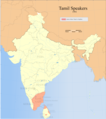Portal:Tamils
The Tamils portal
The Tamils (/ˈtæmɪlz, ˈtɑː-/ TAM-ilz, TAHM-), also known as the Tamilar, are a Dravidian ethnolinguistic group who natively speak the Tamil language and trace their ancestry mainly to the southern part of the Indian subcontinent. The Tamil language is one of the longest-surviving classical languages, with over two thousand years of written history, dating back to the Sangam period (between 300 BCE and 300 CE). Tamils constitute about 5.7% of the Indian population and form the majority in the South Indian state of Tamil Nadu and the union territory of Puducherry. They also form significant proportion of the population in Sri Lanka (15.3%), Malaysia (7%) and Singapore (5%). Tamils have migrated world-wide since the 19th century CE and a significant population exists in South Africa, Mauritius, Fiji, as well as other regions such as the Southeast Asia, Middle East, Caribbean and parts of the Western World.
Archaeological evidence from Tamil Nadu indicates a continuous history of human occupation for more than 3,800 years. In the Sangam period, Tamilakam was ruled by the Three Crowned Kings of the Cheras, Cholas and Pandyas. Smaller Velir kings and chieftains ruled certain territories and maintained relationship with the larger kingdoms. Urbanisation and mercantile activity developed along the coasts during the later Sangam period with the Tamils influencing the regional trade in the Indian Ocean region. Artifacts obtained from excavations indicate the presence of early trade relations with the Romans. The major kingdoms to rule the region later were the Pallavas (3rd–9th century CE), and the Vijayanagara Empire (14th–17th century CE). The island of Sri Lanka often saw attacks from the Indian mainland with the Cholas establishing their influence across the island and across several areas in Southeast Asia in the 10th century CE. This led to the spread of Tamil influence and contributed to the cultural Indianisation of the region. Scripts brought by Tamil traders like the Grantha and Pallava scripts, induced the development of many Southeast Asian scripts. The Jaffna Kingdom later controlled the Tamil territory in the north of the Sri Lanka from 13th to 17th century CE. European colonization began in the 17th century CE, and continued for two centuries until the middle of the 20th century. (Full article...) Selected article -The Chola dynasty (Tamil: [t͡ʃoːɻɐr]) was a Tamil dynasty originating from southern India. At its height, it ruled over the Chola Empire, an expansive maritime empire. The earliest datable references to the Chola are from inscriptions dated to the 3rd century BCE during the reign of Ashoka of the Maurya Empire. The Chola empire was at its peak and achieved imperialism under the Medieval Cholas in the mid-9th century CE. As one of the Three Crowned Kings of Tamilakam, along with the Chera and Pandya, the dynasty continued to govern over varying territories until the 13th century CE. The heartland of the Cholas was the fertile valley of the Kaveri River. They ruled a significantly larger area at the height of their power from the latter half of the 9th century till the beginning of the 13th century. They unified peninsular India south of the Tungabhadra River and held the territory as one state for three centuries between 907 and 1215 CE. Under Rajaraja I and his successors Rajendra I, Rajadhiraja I, Rajendra II, Virarajendra, and Kulothunga Chola I, the empire became a military, economic and cultural powerhouse in South Asia and Southeast Asia. (Full article...) General imagesSelected biography -Ilaiyaraaja (born Gnanathesigan Daniel, 3 June 1943) is an Indian musician, composer, arranger, conductor, orchestrator, multi-instrumentalist, lyricist and playback singer popular for his works in Indian cinema, predominately in Tamil, in addition to Telugu, Hindi, Malayalam and Kannada films. Regarded as one of the most prolific composers, in a career spanning over forty-eight years, he has composed over 7,000 songs and provided film scores for over 1,000 films, apart from performing in over 20,000 concerts. He is nicknamed "Isaignani" (the musical sage) and is often referred to as "Maestro", the title conferred to him by the Royal Philharmonic Orchestra, London. Ilaiyaraaja was also one of the first Indian film composers to use Western classical music harmonies and string arrangements in Indian film music, and the first South Asian to compose a full symphony. In 1986, he became the first Indian composer to record a soundtrack with computer for the film Vikram. He also composed Thiruvasagam in Symphony (2006), the first Indian oratorio. (Full article...) CategoriesTopicsTamil People Countrywide: India • Sri Lanka • Canada • Malaysia • Singapore • South Africa • England Related Ethnic Groups: Brahui • Gond • Kannadiga • Khonds • Kodava • Oraon • Malayali • Telugus • Tuluvas Related indigenous Groups: Badagas • Toda • Kuruba
See also: List of Tamil people, Tamil script, Tamil Script Code for Information Interchange Related portalsWikiProjectsThings to do
Associated WikimediaThe following Wikimedia Foundation sister projects provide more on this subject:
Discover Wikipedia using portals
|



























































